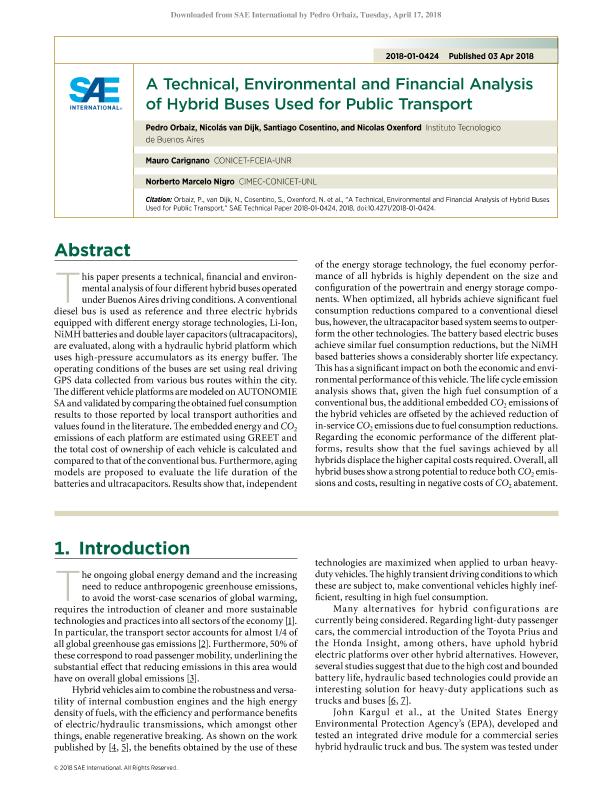Artículo
A Technical, Environmental and Financial Analysis of Hybrid Buses Used for Public Transport
Orbaiz, Pedro Jose; Van Dijk, Nicolás; Cosentino, Santiago; Oxenford, Nicolas; Carignano, Mauro ; Nigro, Norberto Marcelo
; Nigro, Norberto Marcelo
 ; Nigro, Norberto Marcelo
; Nigro, Norberto Marcelo
Fecha de publicación:
04/2018
Editorial:
SAE International
Revista:
Sae Technical Papers
ISSN:
0148-7191
Idioma:
Inglés
Tipo de recurso:
Artículo publicado
Clasificación temática:
Resumen
This paper presents a technical, financial and environmental analysis of four different hybrid buses operated under Buenos Aires driving conditions. A conventional diesel bus is used as reference and three electric hybrids equipped with different energy storage technologies, Li-Ion, NiMH batteries and double layer capacitors (ultracapacitors), are evaluated, along with a hydraulic hybrid platform which uses high-pressure accumulators as its energy buffer. The operating conditions of the buses are set using real driving GPS data collected from various bus routes within the city. The different vehicle platforms are modeled on AUTONOMIE SA and validated by comparing the obtained fuel consumption results to those reported by local transport authorities and values found in the literature. The embedded energy and CO2 emissions of each platform are estimated using GREET and the total cost of ownership of each vehicle is calculated and compared to that of the conventional bus. Furthermore, aging models are proposed to evaluate the life duration of the batteries and ultracapacitors. Results show that, independent of the energy storage technology, the fuel economy performance of all hybrids is highly dependent on the size and configuration of the powertrain and energy storage components. When optimized, all hybrids achieve significant fuel consumption reductions compared to a conventional diesel bus, however, the ultracapacitor based system seems to outperform the other technologies. The battery based electric buses achieve similar fuel consumption reductions, but the NiMH based batteries shows a considerably shorter life expectancy. This has a significant impact on both the economic and environmental performance of this vehicle. The life cycle emission analysis shows that, given the high fuel consumption of a conventional bus, the additional embedded CO2 emissions of the hybrid vehicles are offseted by the achieved reduction of in-service CO2 emissions due to fuel consumption reductions. Regarding the economic performance of the different platforms, results show that the fuel savings achieved by all hybrids displace the higher capital costs required. Overall, all hybrid buses show a strong potential to reduce both CO2 emissions and costs, resulting in negative costs of CO2 abatement.
Palabras clave:
Hybrid Buses
,
Powetrain
,
Life-Cycle Assessment
,
Public Transport
Archivos asociados
Licencia
Identificadores
Colecciones
Articulos(CIMEC)
Articulos de CENTRO DE INVESTIGACION DE METODOS COMPUTACIONALES
Articulos de CENTRO DE INVESTIGACION DE METODOS COMPUTACIONALES
Citación
Orbaiz, Pedro Jose; Van Dijk, Nicolás; Cosentino, Santiago; Oxenford, Nicolas; Carignano, Mauro; et al.; A Technical, Environmental and Financial Analysis of Hybrid Buses Used for Public Transport; SAE International; Sae Technical Papers; 2018-April; 4-2018
Compartir
Altmétricas



